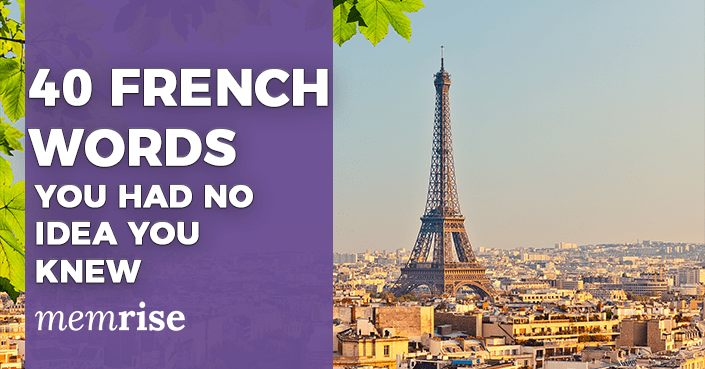Around a third of all words in English come from French. This is due to the Norman conquest of Britain in 1066, when French started to be used in official contexts in England, along with Latin. Although English is a Germanic language, which means it has more in common with languages like Dutch and German, its close contact with French left an indelible mark, which you can still see to this day. The good news is: if you're an English native keen on learning French... you've already got a head start!
Nowadays, we use French words all the time in English, without even realising it! Sometimes it’s a conscious choice to sound a bit fancier, sometimes you use French words to put a bit of distance between you and the person you’re speaking to. Think of the difference between a “hearty welcome” and a “cordial reception”. Both mean exactly the same thing, but a “cordial reception” sounds much colder and less friendly.
Feeling motivated to learn French? Here are 40 French words that you might never have realised that you already know:
blasé
When you just don’t care, in English we’d say you have a “blasé attitude”. Guess what, that’s what you’d say in French too!
chic
If something’s “chic” then it has style. The French are famous for their style, so here’s another word that we shamelessly pinched from them. C’est très chic, non ?
chef
English takes a lot of its food words from French. Perhaps because the English are not as famous as the French for their culinary prowess. The French word chef doesn’t just mean a cook, though, it means your boss: mon chef.
restaurant
If a word seems impossible to spell, chances are it’s French. “Restaurant” is no exception, and literally means “the place that provides food”. Guess what, most of the time the French shorten this to resto, which is much easier to spell!
cuisine
In English, a country’s “cuisine” is the type of food they cook or eat. In French though, la cuisine can also mean “the kitchen”!
sauté
“Sautéd vegetables” in English are just vegetables lightly fried in oil. This comes from the French verb sauter which means “to jump”.
apéritif
When you have a little glass of something before sitting down for a meal, we call that an “apéritif”. This is a word we’ve directly borrowed from the French, but which French took from the Latin aperitivus, which is something that you open with.
picnic
This classic English summer favourite is actually another habit we picked up from the French. The French have been having pique-niques since the mid 18th Century!
fondue
Whether it’s cheese, chocolate or whatever else you might fancy, “fondue” is another French word. It comes from fondre, “to melt down”, and fondu means “melted down”.
mousse
Who doesn’t love a chocolate mousse? Well, in French not all mousses are edible! La mousse means any type of foam, lather or froth.
RSVP
Ever tried to work out what the letters “RSVP” stand for? Turns out they’re actually French for Répondez S’il Vous Plaît, which means “please, respond”.
venue
A venue, which is where an event takes place, is another French word. It comes from the verb venir, which means “come”. Venu means “came”.
entrepreneur
These are the kinds of hands-on people brimming with gumption and ‘can-do’ attitudes that set up and run companies and other business ventures. Entrepreneur literally means “undertaker”, which in English, is actually someone who carries a coffin at a funeral. Don’t get these mixed up!
memoir
Someone’s “memoirs” are a look back on their lives, telling things from their perspectives. This is a French word that we misspell. In French, it’s mémoire, which means “memory”.
souvenir
When you go somewhere and buy something to remember it by, we call that a “souvenir”. That comes from the French word se souvenir, which means “to remember”.
laissez-faire
You may have heard of “laissez-faire attitudes”, which is when you just live and let live. In French, laissez faire literally means “let do”.
nouveaux riches
When people get rich very quickly and start splashing their cash very ostentatiously, we call them the “nouveaux riches”. In French, nouveaux riches means “new rich”.
reconnaissance
A “reconnaissance” mission is when you go to check something out. It comes from the French reconnaître, which means “to recognise”.
impasse
When talks are at a deadlock and no longer progressing, we call that an “impasse”. This comes from the French passer, which means “to pass”. With im– at the front, it literally means “impossible to pass”.
gaffe
Another word for a blunder, or unintentional, embarrassing act, is a “gaffe”. This comes from the French gaffe, which is actually a Provençal word from the south of France.
faux pas
If you say or do something tactless in a social situation, we’d say you’ve made a “faux pas”. This comes from the French faux pas, which means “false step”.
debacle
When something is a complete failure or fiasco, we might call that a “debacle”. It comes from the French débâcler, which means to “unleash”.
façade
When someone puts up a “façade”, they stop you from seeing how they really feel. It refers to the different tiles you put on the outside of the house, which in French are called façade because of the different faces on each tile.
décor
The way you furnish and decorate a room is called its “décor”, which is a French word (décor), and comes from the verb décorer, which means “to decorate”.
chaise longue
A “chaise longue” is a sofa that only has a backrest at one end, inviting you to sprawl out on it. In French, chaise longue literally means a “long chair”.
chauffeur
A “chauffeur” is a professional driver. It comes from the verb chauffer, which means “to heat”, and refers to when drivers had to heat steam engines on trains.
brunette
A brown-haired lady is a “brunette” in English. In French, brun means “brown”, and the -ette ending refers to women (think “suffragette”).
cul-de-sac
A “cul-de-sac” is a dead-end or road that goes nowhere. In French le cul de sac literally means “the bottom of the bag.”
concierge
A “concierge” is a caretaker, but posher. Normally you’ll find one in a hotel. In French, concierge does just mean caretaker (hotel or otherwise).
clique
When you have a small, close-knit group of friends you call that a “clique”, in both English and French. This comes from the word cliquer, “to make a noise”, and refers to when people used to get paid to go along and applaud the Paris Opera in the mid 19th Century.
silhouette
Your shadow or outline is called a “silhouette” in English. In French, silhouette refers to someone’s figure or shape. Apparently this was named after Étienne de Silhouette, a French author and politician in the 18th Century.
petite
When someone is attractively small and dainty, you might call them “petite”. This comes from the French word petite, which means “small”.
déjà vu
Ever had that feeling that you’ve seen something before? We don’t have a word for that in English, so we just pinched the French: déjà-vu, which literally means “already seen”.
en route
You might have spelled this once as “on route”, but actually it’s a French expression: en route, which means that you’re on your way.
fiancé
There’s no word in English for when two people get engaged, so we just use the French: fiancé (fiancée for a woman). In old French, une fiance means a promise.
voyeur
A peeping Tom, or someone who watches others, is called a “voyeur”. This comes from the French voir, which means to see.
cliché
When something’s predictable, or a stereotype, you’d call it cliché. This comes from the French verb clicher, which means “to stereotype”.
bouquet
Why give someone a bunch of flowers, when you can give them a “bouquet”? The French word bouquet also means “bouquet”, but originally meant a “clump of trees”. It was related to the Old French word bos, which meant ‘wood’.
faux
A “faux” leather sofa means it’s fake. In English, “faux” means anything false or put on, like “faux concern”. In French, faux means false.
 Alex is Memrise’s Language Learner in Residence. He spends his time working with the Language Research Team, making fun videos about languages, and contributing to the Memrise blog. He tweets @rawlangs_alex.
Alex is Memrise’s Language Learner in Residence. He spends his time working with the Language Research Team, making fun videos about languages, and contributing to the Memrise blog. He tweets @rawlangs_alex.
In his free time he enjoys cooking, watching films, and walking his dog. He also writes books, like this one.









